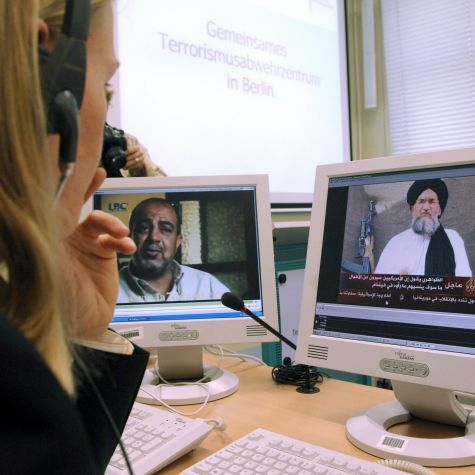The German domestic intelligence community

The German domestic intelligence community
The Federal Republic of Germany is a federation consisting of 16 federal states. Each of these federal states has its own constitution and also its own domestic intelligence service (Landesbehörde für Verfassungsschutz). Within the territory of their federal state, these domestic intelligence services collect information on efforts directed against the free democratic basic order. Thus, they make an important contribution to protecting our fundamental constitutional values.
The domestic intelligence service of each federal state acts independently and is not subject to the instructions of the Bundesamt für Verfassungsschutz (BfV), which is the domestic intelligence service of the Federation. However, protecting the constitution is a task performed jointly by the Federation and the federal states. Pursuant to the Federal Act on the Protection of the Constitution (BVerfSchG), they are obliged to cooperate as well as to support and assist one another.
Federal task sharing
Subject- and results-oriented domestic intelligence cooperation between the Federation and the 16 federal states can only be successful in an efficiently organised community in which there is mutual exchange of all relevant information.
Responsibilities
As a rule, tasks are shared between BfV and the domestic intelligence services of the federal states in the following manner:
- The domestic intelligence services of the federal states are responsible for collecting and analysing information on extremist efforts, activities posing a security risk and activities on behalf of foreign intelligence services within their respective federal states. To this end, each of the 16 services of the federal states has its own legal framework.
BfV additionally collects and analyses information on efforts and activities that concern the country as a whole or that are aimed at using, preparing, supporting or promoting violence. Within the German domestic intelligence community, BfV moreover acts as its central body: it coordinates and supports the domestic intelligence services of the federal states in the performance of their duties.

Challenges
In the Federal Republic of Germany, 17 agencies deal with domestic intelligence matters. This is a challenge for how this mission as such is organised and at times raises numerous questions on how cooperation works in practice:
How can the services guarantee that collected information is shared with one another? How can the services make sure that there is efficient coordination when several of them work on an issue? How do they decide who takes the lead? How can information be passed on quickly to other security agencies? How can operational measures relating to information gathering be coordinated efficiently with one another?
In the history of the domestic intelligence services in Germany, finding answers to these and many other questions has required reassessments time and again and has led to legal and organisational changes to the way in which the German domestic intelligence community works together. This has not least been necessary in the light of changing threats to our democracy and to our fundamental values guaranteed by the constitution.
Forms of cooperation
BfV and the domestic intelligence services of the federal states have a close cooperation based on mutual trust at all levels of hierarchy. The services regularly discuss and agree on the general priorities of work and exchange all information relevant to work in a given field.
In addition to cooperation within bodies and working groups, the Intelligence Information System and Knowledge Network (NADIS-WN) plays a key role.
NADIS-WN is the joint IT system of the German domestic intelligence community. It is centrally operated by BfV, and the domestic intelligence services of all the federal states are involved in it. The German domestic intelligence services use it for the purpose of informing one another about their intelligence. The system enables the services to analyse links between individuals and incidents in all fields and for the country as a whole. In this way, it is easier to identify structures and it is possible to avoid information islands when it comes to countering all forms of extremism. Information may only be stored in NADIS-WN on the basis and in consideration of the strict statutory provisions in the acts on the protection of the constitution of the Federation and of the federal states.
In addition to the cooperation within the German domestic intelligence community, there is the cooperation of BfV and the domestic intelligence services of the federal states within the Joint Counter-Extremism and Counter-Terrorism Centre (GETZ) in the fields of right-wing extremism, left-wing extremism and foreign extremism (excluding Islamist extremism) as well as counter-intelligence and within the Joint Counter-Terrorism Centre (GTAZ) in the field of Islamist extremism and terrorism. In these two platforms, in which other security agencies of the Federation and the federal states are also represented, the staff responsible for analysing and gathering information and for reporting work tirelessly every day to ensure that it is possible to respond very quickly and efficiently to threats to the internal security of the Federal Republic of Germany.
Federal cooperation – a success story
Time and again, the cooperation of BfV and the 16 domestic intelligence services of the federal states within the German domestic intelligence community has been criticised as old-fashioned or behind the times. In fact, though, it is federal task sharing in a large country like the Federal Republic of Germany with more than 83 million inhabitants that makes the German domestic intelligence services a reliable partner for German citizens when it comes to internal security.
The domestic intelligence services of the federal states have their own expertise regarding the work in their respective federal states. It would not be possible or quite difficult for BfV on its own to reach this level of expertise. Moreover, the domestic intelligence services of the federal states are well networked with the public authorities of their own federal states. Therefore, they are able to provide a quick and targeted response to dynamic and changing situations in different fields and to make available the necessary resources for this work. Finally, they are also able to launch and offer tailored actions, programmes and services for citizens and those concerned.
BfV is mainly responsible for the contact with foreign partner services and thus acts as the central point of contact. The domestic intelligence services of the federal states have only limited possibilities in this field.
In the last few years, moreover, a clear legal framework and an organisational structure that continuously evolves and improves have contributed to a further harmonisation of the ways in which the German domestic intelligence services work. They have also put everything in place so that the German domestic intelligence community, as an important pillar of the security architecture of the Federal Republic of Germany, will continue to be able to detect threats to our free society early on.




